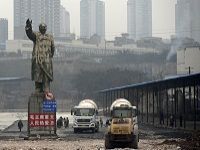How to Succeed in China: Brand Secrets
The main goal of big brands tired of the sluggish North American and European economy is a large number of Chinese consumers representing the middle class. Which companies were able to achieve success in this fight for the market share? Research company Millward Brown studied the history of the 20 most powerful foreign brands in China and summed up the secrets of their success.

In the period between 2011 and 2013 Millward Brown surveyed nearly 60,000 people and conducted interviews with consumers in ten Chinese cities. Out of the top 20 brands, 13 were American, two German and French, one Italian, one Anglo-Dutch (Unilever) and one - a representative of South Korea (Samsung).
Foreign companies have plenty of opportunities for development in China. Despite the fact that price is the decisive factor for the Chinese consumer, because of rising living standards and falling confidence in the Chinese brands, more people are bringing their money to western companies. A representative of Millward Brown Peter Walsh said that the study showed that over the past three years, the credibility of the Chinese brands has dramatically decreased. This is a good opportunity for international brands to make a move as consumers begin to appreciate the quality and experience of the producers as much as the low cost of goods.
What does a company need to succeed in China? BBC journalists asked 11 companies from the list - Coca-Cola, McDonald's, Nike, L'Oreal, Apple, Samsung, Adidas, Armani, Omo, Volkswagen and the leader of the rating KFC to talk about how they won the hearts of the Chinese consumer.
Come early
All leading brands came to China before 2000, and Coca-Cola started in the country as early as in 1927. As a result, 20 years later, in 1948, the company was selling over a million bottles a year in Shanghai, making it the second city in the world in terms of consumption of this beverage. Nike representatives say that their company came to China in 1981, Volkswagen - in 1983, KFC - in 1987 and McDonald's - in 1990. The proverb "An early bird catches the worm" in the case of China is fully justified.
Understand your market
The Chinese market is changing rapidly and many companies have to quickly learn to catch up with it. "Everyone learns how they should work in the changing social relations and the continuous growth of consumption, even the Chinese," explained a McDonald's representatives. "Do not assume that what works in mature markets will work in China. Success comes to those who are focused on the needs of the Chinese consumer. "
Other brands, such as the brainchild of Unilever, detergent Omo, focused on the understanding of consumer behavior. For example, the company's brand marketers found that in most markets buyers use three buckets of water for doing laundry, while the Chinese use five. Considering this information, the brand developed its concept that consumers gladly welcomed. This is precisely why Omo ranks eighth in the list of the 20 most successful Western brands in China.
Giorgio Armani says that when he started working in China, he painted the door of his shop in Beijing red. According to the designer, it was supposed to attract customers. Now, however, Armani's offerings for the Chinese are no different than the goods offered to other countries because Chinese customers crave western style.
Go big
Many make significant progress because they are not shy. Some numbers are truly striking. For example, KFC has 4.4 thousands of restaurants in 850 cities and 700 more will be opened by the end of this year. McDonald's opens ten restaurants a week, and Coca-Cola will invests in business development in China $4 billion by 2015. Apple in the next two years to double the number of stores, and for Volkswagen China is the largest market that provides a third of its profits.
Expand geographically
Most brands emphasize that it is important to be able to look beyond Beijing and Shanghai as other cities in the country show a staggering increase in the number of new customers. Both Samsung and L'Oreal are well aware of it and actively cover the regions. Adidas says that half of its 800 stores opened in the past year are located in the so-called "lower tier cities." In the north and the south consumer tastes are different, but the common element is the love for the "inspiring" Western brands.
Build your team
Doing business in China is difficult if the entire team is comprised of foreigners. One of the main secrets of the success of multinational companies on Chinese soil is finding local talent. KFC, L'Oreal, Volkswagen and Adidas unanimously say that the Chinese staff helps them better understand the local customers.
Natalia Sinitsa
Subscribe to Pravda.Ru Telegram channel, Facebook, RSS!

